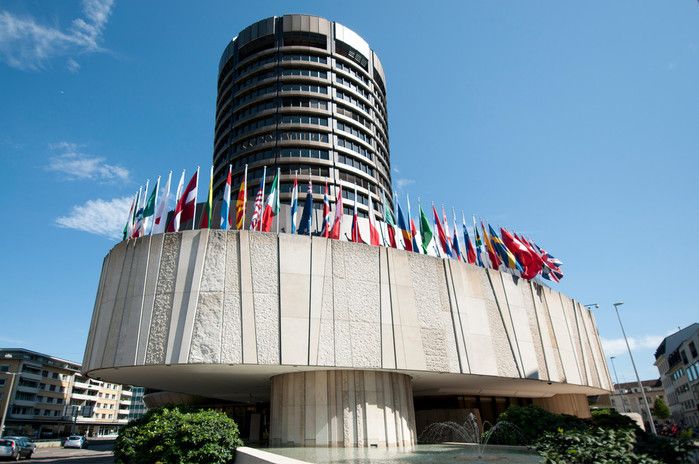The big bad bank

The Bank for International Settlements (BIS) facilitated Nazi war crimes in World War II. The Bretton Woods conference recommended it be liquidated. Instead, it was expanded. Now it's the "bank for central banks". That's all old news. But it seems there is a new chapter in the story. Today the BIS is defending its role in those old war crimes.
The BIS is not shy about its prominent role in modern banking. The first sentence of its "overview" statement is: "Our mission is to serve central banks in their pursuit of monetary and financial stability, to foster international cooperation in those areas and to act as a bank for central banks." That grand mission is widely supported. The BIS says it "is owned by 60 central banks, representing countries from around the world that together account for about 95% of world GDP." It has a long history of coordinating transfers between countries. It is a major intermediary in the international financial system.
The BIS was active in transferring gold between countries before and during World War II. Its conduct was questionable, to say the least. The BIS itself says the "most controversial" of its decisions was "to honour an order received from the Czechoslovak National Bank to transfer part of its gold reserves held in a BIS account at the Bank of England in London to a German Reichsbank account". But "controversial" might be too lenient.
The Nazis invaded Prague on the evening of 15 March 1939. They soon "sent armed soldiers to the offices of the National Bank. The Czech directors were ordered, on pain of death, to ... transfer 23.1 metric tons of gold from the Czechoslovak BIS account, held at the Bank of England, to the Reichsbank BIS account". The BIS complied. The Nazis used that gold to make payments for the rest of the war.
In 1944, before the war had even ended, the Norwegian delegation to the Bretton Woods conference detailed the BIS's cooperation with the Nazis. It proposed that the BIS be abolished. There was not a single objection. The Final Act of the Bretton Woods conference recommended "The liquidation of the Bank for International Settlements at the earliest possible moment." But that did not happen. Apparently "the top U.S. officials most critical of the BIS left office". "European central bank governors" decided the BIS could be repurposed and "successfully lobbied for maintaining the BIS". Not only does it still exist today, it has more power and responsiblity than ever. Yet, rather than turning a new leaf, it has the nerve to quibble over its past.
The BIS says the request to transfer all the Czech gold to Germany "dated from before the war". Technically speaking, that's true. But it is no legal defense. The German occupation of Czechoslovakia was a explicit breach of the Munich Agreement. Germany had pledged not to invade Czechoslovakia, then did anyway. The BIS received the transfer request almost immediately after the Germans seized Prague. It was clearly of German origin, not Czech. So why would the date be relevant? Imagine someone saying, "Driving the getaway car for the robbers dated from before the arrest warrant." Okay, but didn't the gunfight and the car chase hint that something illegal was happening?
The BIS also says the request was, "as it later transpired, under duress." As it later transpired? They knew the place had just been invaded in violation of international compact! The request was obviously issued under duress. The BIS seems to be saying it didn't specifically know Czechoslovak National Bank directors had been threatened with execution. To continue the analogy, that's like saying, "We knew they were robbers when we drove the getaway car, but we didn't know they had threatened to kill the bank manager." Isn't personally threatening people with violence what armed robbers do, by definition?
The BIS continued to collect interest payments from Germany during World War II. "The largest part of these interest payments were made in gold." Today the BIS admits this gold "had originally been looted from the central banks of [the Czech Republic,] Belgium and the Netherlands." It suggests it didn't know where the gold had come from because it "had been remelted at the Prussian mint to conceal its origin." That's like saying, "The robbers paid me to drive the getaway car, but they said the money they gave me wasn't stolen." Gosh, they seemed like trustworthy guys.
Today the BIS refers to "its supposed domination by the Axis Powers during the war". Yes, just "supposed." This snippet summarizes the BIS approach to its wartime retrospectives; acknowledge a little, then deflect, excuse and quibble. Maybe it's an effort to restore the Bank's tarnished reputation. Regardless, it's a problem. In refusing any real responsibility, the BIS is effectively saying "we would do the same today." That is the unnerving result of our failure to hold the BIS accountable like we agreed to in 1944.
It seems we can't even hold our government institutions accountable for helping the Third Reich. If that's true, is it possible to hold them accountable for anything?
Related reading
- "How Bank of England 'helped Nazis sell gold stolen from Czechs'" (Guardian)
- "Nevermind the Czech gold the Nazis stole..." (Telegraph)
- Kubu, E. (1998). "Czechoslovak gold reserves and their surrender to Nazi Germany" In Nazi Gold, The London Conference. London: The Stationery Office, pp. 245–48. Shelved in the US National Archives Library at HV6665.G3L66 1997.
- Schuler/Rosenberg, The Bretton Woods Transcripts, pp. 566.
Photo credit: BIS
